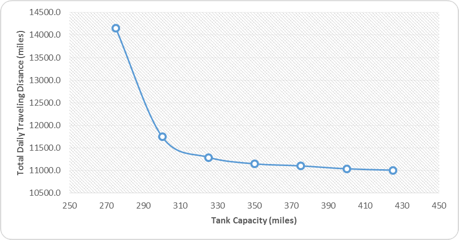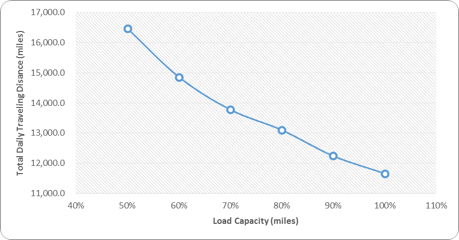News | METRANS Examines Routing Strategies for AFVs in Freight Delivery Deployment
Stop the VideoNews

METRANS UTC
METRANS Examines Routing Strategies for AFVs in Freight Delivery Deployment
Sunday, April 2, 2017
By Shichun Hu, USC MS ISE 2017
Transportation plays a major role in contributing to global warming, with nearly 30% of CO2 emissions coming from the sector. As a result, the industry is working hard to explore the feasibility of alternative fuel and electric vehicles.
Under this general background, METRANS Researcher Professor Maged Dessouky and Ph.D. candidate Ethan Shao conducted research on how to efficiently deploy alternative fuel vehicles (AFVs) for freight delivery. The type of alternative fuel vehicles picked in this research is Compressed Natural Gas (CNG) trucks, which compared with traditional diesel freight trucks have reduced range, smaller load capacity, and sparsely distributed fueling stations.

Source: https://commons.wikimedia.org/wiki/File:ElfCNG-MPI.jpg
In order to see whether those disadvantages outweigh the advantages of low carbon emission benefits brought by CNG trucks, Dessouky and Shao introduced the CNG Truck Routing Problem with Fueling Stations (CTRPFS) to model the actual situation where decisions are made regarding to vehicle routes including the choice of fueling stations. Then they developed a Mixed Integer Programming (MIP) model with preprocessing and valid inequalities to generate an optimal solution. The optimality is usually reached in a small number of instances. For a large problem set of realistic size, a hybrid heuristic method was proposed, combining an Adaptive Large Neighborhood Search (ALNS) with a local search and a MIP model.
The algorithm was tested using the estimation of daily goods delivery data for the Ports of Los Angeles and Long Beach. In figure 1 (below), Dessouky and Shao illustrate “the total daily traveling distance[1] for CNG trucks with different tank capacities.” They add that the total daily traveling distance for CNG trucks can be reduced significantly when the tank capacity increases from 275 miles to 300 miles, and finally be very close to the benchmark from diesel trucks, which is 10,677.6 miles. This demonstrated the efficiency of ALNS. Through figure 2 (also below), they intuitively present the relationship between load capacity and total daily traveling distance.

Figure 1. Total daily traveling distance with different tank capacities

Figure 2. Total daily traveling distance with different load capacities
Conclusions drawn are: a) Load capacity is a major factor affecting total daily traveling distance of CNG freight trucks; b) Thanks to the current availability of the public CNG fueling stations in the Southern California area, the influence of the tank capacity from CNG trucks can be reduced to a low level under the proposed deployment strategy.
For more information on this research project, please click here.
[1] The total daily travel distance is calculated based on a fleet that has more than 100 trucks.
Maged Dessouky
Professor Dessouky is an Associate Director of METRANS Transportation Center. His research has been funded by the National Science Foundation, Society of Manufacturing Engineers, PATH, Caltrans, FTA, Department of Defense, and Department of Homeland Security and its National Center for Risk and Economic Analysis of Terrorism Events (CREATE) among others. He was the recipient of the 2007 Transportation Science & Logistics Best Paper Prize ("Optimal Slack Time for Schedule-Based Transit Operations"). He is a Fellow of the Institute of Industrial Engineers. Dr. Dessouky was a recipient of IIE Operations Research Division Excellence in Teaching Award, the USC Associates Award in Teaching (Top University Award for Teaching), Alpha Pi Mu/Omega Rho Outstanding Teacher of the Year in Industrial Systems Engineering, the USC Award for Excellence in Teaching, and the TRW School of Engineering Teacher Award. He is the Area/Associate Editor of Computers & Industrial Engineering, IEEE Transactions on Intelligent Transportation Systems, IIE Transactions, and Transportation Research Part B: Methodological, on the editorial board of Transportation Research Part E: Logistics and Transportation Review, and previously served as Area Editor of ACM Transactions of Modelling and Computer Simulation, and is listed in Who's Who in Science and Engineering.
Shichun Hu
Author Shichun Hu is a student assistant at METRANS Transportation Center specializing in research project administration and coordination of the METRANS Mentor Program. She is a 2nd year graduate student majoring in Industrial and System Engineering in the Viterbi School of Engineering, USC. Her interests are using data and operation research methods to improve urban logistics and the supply chain. She is pursuing analytical internships in these fields. She can be reached at [email protected].
News Archive
- December (1)
- November (6)
- October (4)
- September (2)
- August (3)
- July (4)
- June (3)
- May (7)
- April (8)
- March (11)
- February (8)
- January (7)
- December (7)
- November (8)
- October (11)
- September (11)
- August (4)
- July (10)
- June (9)
- May (2)
- April (12)
- March (8)
- February (7)
- January (11)
- December (11)
- November (5)
- October (16)
- September (7)
- August (5)
- July (13)
- June (5)
- May (5)
- April (7)
- March (5)
- February (3)
- January (4)
- December (4)
- November (5)
- October (5)
- September (4)
- August (4)
- July (6)
- June (8)
- May (4)
- April (6)
- March (6)
- February (7)
- January (7)
- December (8)
- November (8)
- October (8)
- September (15)
- August (5)
- July (6)
- June (7)
- May (5)
- April (8)
- March (7)
- February (10)
- January (12)















